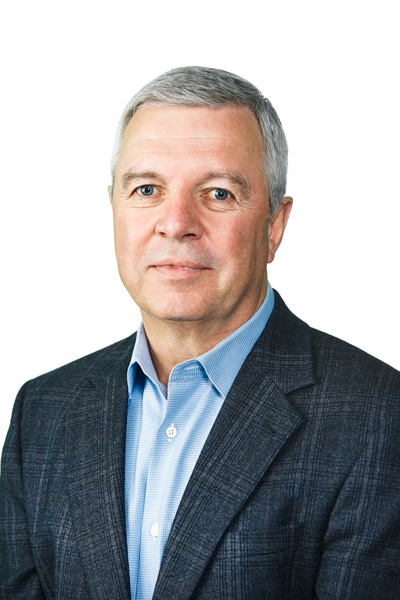
Richard Emmett has worked in the restaurant and hospitality industry his entire life. Starting as a dishwasher at the Chadwick Pancake House on the Jersey Shore when he was thirteen, Emmett has worked as a waiter, cook, manager, and developer. He was even an owner in a partnership of nearly thirty Papa John’s restaurants located in Indiana and Wisconsin while serving as general counsel for that company. Emmett was also part of the leadership team that helped Papa John’s grow from one to more than three thousand units.
Today, Emmett’s extensive experience is being used in his role as chief legal and human resources officer at Dunkin’ Brands, the parent company of the Dunkin’ Donuts and Baskin-Robbins brands. His legal and HR expertise, combined with his experience as a former franchisee, has helped him identify and implement critical initiatives aimed at improving franchisees’ ability to recruit, hire, train, and retain a quality workforce in an increasingly competitive labor market.
The company’s People First Summit is representative of those efforts. Inaugurated in 2015, the event afforded Dunkin’ Donuts franchisees to network and share best practices to develop a positive and inclusive culture to help them become the employer of choice. The summits have presented practical topics such as “The Importance of a People First Culture,” “Suggestions to Hire Tough, Manage Easy,” “Rewards Strategies to Drive a High-Performance Culture,” and “Ways to Engage Top Talent.”
Employee turnover tends to be higher in the restaurant industry than in the private sector due to several factors, including higher proportions of student- and part-year employees in the workforce. In fact, the turnover rate in the economy’s hospitality segment topped 70 percent for the second consecutive year in a row, according to a data from the US Bureau of Labor Statistics.
“There are high costs involved with recruiting, hiring, and training new employees, and it’s an exceptionally important investment for our franchisees,” Emmett explains. “We are an integral part of our customers’ daily lives, and it’s important that the foods and beverages they order and the overall guest experience are consistently positive every single day. Hiring and retaining a quality staff is a key ingredient in achieving that goal.”
“In franchising, as with most relationships, it takes years to build trust. As in any other relationship, it’s that trust that helps you get through the tough times.”
Richard Emmett
On the legal side, Emmett believes attorneys are underutilized. “Too many times, attorneys are sought out simply to check the legal box. In my view, limiting them to that role is wasting a valuable resource. Most attorneys are fully capable of actively participating in the business on a day-to-day basis and at a strategic level,” Emmett says. “For that to happen, both parties must recognize and appreciate lawyers’ value-add to the business. Those on the business side need to understand that attorneys can bring a lot to the table well beyond simply their legal acumen. And attorneys need to step up and take advantage of the opportunity to demonstrate their broader value to the organization. I tell my attorneys the greatest compliment they can receive is to be introduced by the business as a member of the team and, by the way, they’re our lawyer.”
Emmett speaks passionately about the importance of a strong relationship between franchisees and
franchisors. In most cases, the two are completely aligned in their goals, namely to succeed in pleasing the consumer and beating the competition. But there are instances where the parties’ interests may diverge.
“In franchising, as with most relationships, it takes years to build trust,” Emmett says. “As in any other relationship, it’s that trust that helps you get through the tough times. And in business, there will always be tough times.”
He says that open communication is particularly important to building trust between the parties. “Franchisees need to understand what the franchisor’s goals are and why those goals are important,” he says. “Conversely, the franchisor needs to understand the franchisees’ concerns and point of view from both a business and store level. Once that communication occurs, the parties are in a much better place to work together toward a solution. It should never be us versus them. We have to work together.”
In addition to building trust, Emmett emphasizes the importance of constantly monitoring your business and business environment because it is constantly changing. And evolving technological advances have made that change all the more pronounced. He encourages his teams to not only stay current, but to also think about the future.
“Wayne Gretzky said it best, ‘Skate to where the puck’s going to be,’” he says. “Doing so will make them better HR and legal professionals and help add value to the business and stay ahead of the competition.”
At the same time, Emmett takes solace in the enduring appeal of the Dunkin’ Donuts and Baskin-Robbins brands. He says that it’s remarkable that two brands, both of which are roughly seventy years old, are more relevant today than at any time in the past. In fact, he points to one recent event in California, where customers started lining up more than twenty-four hours before a new Dunkin’ Donuts restaurant opened just to be among the first patrons.
“Whether you’re in HR or legal providing services to your corporate clients, or you’re behind the store counter serving coffee, donuts, or ice cream to customers, great products and services are paramount,” Emmett says. “That’s what keeps customers coming back day after day.”
Photos: James Scherer, Doug Levy
Gray Plant Mooty and its Franchise & Distribution Practice Group congratulate Richard Emmett, chief legal and human resources officer at Dunkin’ Brands, on being honored for his leadership. Gray Plant Mooty is proud of its relationship with Dunkin’ Brands and people like Rich Emmett, who have made the company great.

